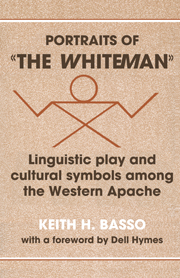Book contents
4 - Joking imitations of Anglo-Americans: social functions
Published online by Cambridge University Press: 05 July 2015
Summary
You must want to learn from your mother
You must listen to old men
not quite capable of becoming white men.
—David W. Martinez (“New Way, Old Way,” Voices from Wah'kon-tah)Having inquired into the interpretive functions of Western Apache joking imitations, we are now in a position to consider some of their pragmatic counterparts. What, in other words, of the social functions served by imitations of Anglo-Americans? What of the purposes these performances are used to accomplish in face-to-face encounters? In particular, what of the kinds of messages that joking imitations communicate about the persons who perform them and their relationship with individuals they cast in the role of butt? What, in short, of social meanings?
The social significance Western Apaches attach to joking is commonly discussed by them in terms of a traditional analogy that likens the development of solidarity in inter- personal relationships to the process by which “deerhides” (bįįh hi kágé) are fashioned into pieces of fine ‘buckskin’ ('iban). Let us proceed, then, by describing this analogy and examining some of its implications. The basic premise is as follows: interpersonal relationships, like untanned hides, are initially ‘stiff’ (ntł'iz) and therefore of little practical value; consequently, they must be gradually worked through successive stages of increasing pliability until, having become fully ‘soft’ (d'ilé), they become useful as well and can be counted on, given proper care and attention, to soften even further and become more useful still. Persons with ‘stiff’ relationships are typically those who have met only recently and, being anxious not to offend each other, behave with cautious formality and studied respect. This is as it should be, Apaches point out, because ‘stiff’ relationships, like untanned hides, can be easily ‘cracked’ [hisdla') and are frequently difficult to mend.
- Type
- Chapter
- Information
- Portraits of 'the Whiteman'Linguistic Play and Cultural Symbols among the Western Apache, pp. 65 - 76Publisher: Cambridge University PressPrint publication year: 1979

